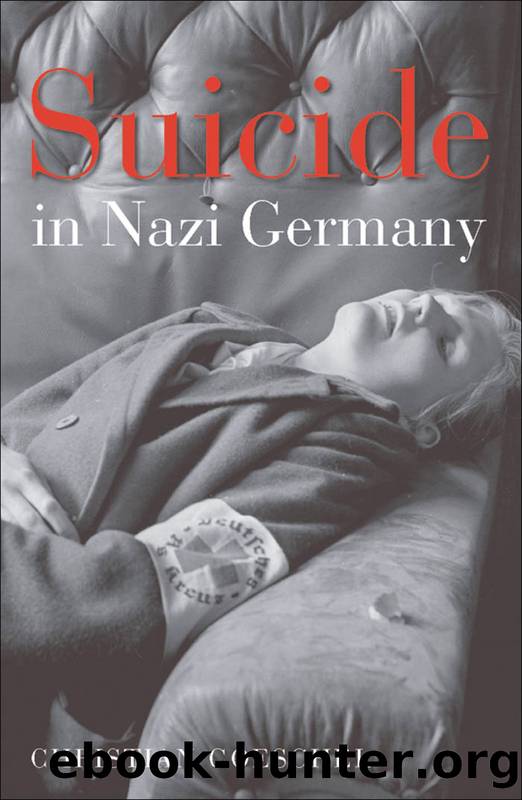Suicide in Nazi Germany by Goeschel Christian;

Author:Goeschel, Christian;
Language: eng
Format: epub
Publisher: Oxford University Press USA - OSO
Published: 2009-07-14T16:00:00+00:00
VI
Most of the Jews who were deported to the concentration or death camps either died on the way or were murdered in the camps themselves.86 Needless to say, many of those who allegedly committed suicide in the camps had, in fact, been murdered or tortured to death by the SS. SS attitudes towards suicide of camp inmates underwent a fundamental transformation once killing on a mass scale had begun. No longer did guards encourage prisoners to commit suicide. The SS severely punished suicide attempts, since suicide was an expression of self–determination. Suicide ran counter to the Nazi total claim over the lives and bodies of the inmates.87
Scholars suggest that there were relatively few suicide attempts in the concentration and death camps during the Holocaust. Under extreme life–threatening conditions ‘there is a tremendous increase in the selfpreservation instinct’, one scholar notes, based on memoirs of survivors of concentration camps. The inmates’ depersonalization allegedly did not allow them to reflect on suicide. This was particularly common among the so–called Muselm¨anner, inmates who had lost their individuality and desire for self–preservation, but were also so apathetic that they lacked even the will to kill themselves.88
Some did, however. Evidence from the Mauthausen concentration camp, set up by the Nazis near Linz after the Anschluss, confirms this view. On 8 September 1942, the Hamburg lawyer Otto B, a Jew, committed Suicide by running into the electrified fence there. The SS wrote to his wife that her husband had been cremated and that she could apply for a death certificate by sending in 72 pfennigs.89 In a PhD thesis written in 1943, the Austrian Jew Paul Neurath, an inmate of Dachau and Buchenwald after the Anschluss, before he emigrated to the USA, draws an intriguing picture of SS attitudes towards suicide, which, at least at this stage, were entirely arbitrary: ‘If a guard wants to drive someone into suicide, he subjects him to chicanery until he [the inmate] cannot stand it any longer; if he wants to kill him immediately, he does; but if he wants to prevent the suicide, the man who has undertaken the failed attempt receives 25 lashes.’90
The author Jean Améry, a survivor of Auschwitz who committed suicide himself in 1978, remembered later that ‘only relatively few had decided to run into the barbed wire ...’, since inmates were so afraid of being severely punished by the SS for attempting suicide that they did not dare try in case they failed. If the SS or Kapos (prisoner functionaries) caught people during their suicide attempt, they would usually kill them in a particularly cruel way.91 In contrast to this, the psychoanalyst Bruno Bettelheim, himself a former inmate of Dachau and Buchenwald, claimed: ‘Psychologically, most prisoners in the extermination camps committed suicide by submitting to death without resistance.’92 But in these circumstances, resistance would have been suicide too. Hermann Langbein, an Austrian survivor of Auschwitz, confirmed this. Suicide, Langbein claimed, was always a widely discussed idea at Auschwitz, due to the constant and unbearable torture and humiliation inmates had to endure.
Download
This site does not store any files on its server. We only index and link to content provided by other sites. Please contact the content providers to delete copyright contents if any and email us, we'll remove relevant links or contents immediately.
| Grief & Bereavement | Hospice Care |
| Pet Loss | Suicide |
They Both Die at the End by Adam Silvera(8611)
Thirteen Reasons Why by Jay Asher(7788)
The Space Between by Michelle L. Teichman(6088)
Suicide Notes by Michael Thomas Ford(4273)
Tuesdays with Morrie by Mitch Albom(3832)
Suicide: A Study in Sociology by Emile Durkheim(2609)
The Checklist Manifesto by Atul Gawande(2203)
Tuesdays With Morrie by Mitch Albom(2172)
Robin by Dave Itzkoff(2005)
In the Woods by Tana French(1996)
Bossypants by Tina Fey(1987)
No Ashes in the Fire by Darnell L Moore(1981)
Reservoir 13 by Jon McGregor(1852)
End of Days by Sylvia Browne(1823)
Olive Kitteridge by Elizabeth Strout(1790)
Bus on Jaffa Road by Mike Kelly(1784)
All Things New by John Eldredge(1781)
Scar Tissue by Anthony Kiedis(1771)
No Time to Say Goodbye(1760)
